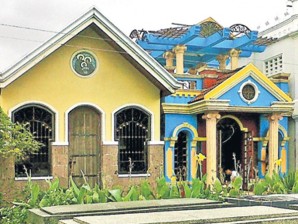Colors liven up cemetery

SPLASH OF COLORS Tombs and niches of the well-to-do stand out in a cemetery in Pila town in Laguna. MARICAR P. CINCO/INQUIRER SOUTHERN LUZON
A graveyard is not always a painful reminder of loss and grief.
In a cemetery in this town of Laguna, the playful touches of purple and the vibrant shades of blue stand out to give life to memories of lost loved ones.
“This one looks like something taken out of the Enchanted Kingdom,” a patrolling cop pointed to one mausoleum.
Beside it stood another mausoleum with walls painted yellow and brown. Others showed a combination of blue and yellow, yellow and gray, blue and purple.
Ramon Catamora’s job is to repaint niches and tombs at Pila Memorial Park here. He has begun repainting a two-story mausoleum, which he expects to dry up before the owners come to visit on All Souls’ Day.
Article continues after this advertisement“Maybe these are their favorite colors,” he said, when asked about the tomb that stands out from rows of bare concrete niches.
Article continues after this advertisementThe mausoleum’s facade is painted royal blue, the interior is maroon, the two pillars are in eggshell white while the facade’s borders are in amber.
Pleasing to the eyes
Catamora remembered a niche he once painted in a cemetery in nearby Sta. Cruz town. “The family consistently reminded me to paint it purple because it used to be the favorite color (of the dead person).”
From painting niches with the usual white or gray, which most families still prefer, “it feels a little different to use different colors on a tomb,” he chuckled. “It is pleasing to the eyes. People who see this usually say they would want the same for a tomb.”
One two-story mausoleum at the memorial park has a facade of brown mosaic marble tiles. It has sliding windows on the upper deck and a spiral staircase inside. Another looks like a bungalow apartment from afar.
Tombs like houses
Bernardo Relova Jr., 61, owner of the 1.5-hectare cemetery, said families began to combine colors for the tombs when modern-type houses of vibrant hues became popular in recent years.
“It has become a fad to design tombs like houses,” Relova said.
The Pila Memorial Park that Relova opened in 1986 lies between two other cemeteries—the Old Pila Public Cemetery built in 1957 and St. Anthony Memorial Park, a private cemetery that opened about a decade ago.
Filipino way
Korean tourists coming from the Pagsanjan Falls in Pagsanjan town often stop by at Pila Memorial Park to see the structures and “learn about the Filipino way of burying our dead,” Relova said.
“It’s perhaps the way the cemetery is maintained (that attracts people and tourists),” he said.
Niches at the memorial park are mapped out with a standard distance between them. “Apartment-type” niches—one placed atop another—are not allowed, Relova said.
Perpetual care
Relova also planted trees bearing chico, avocado, tamarind and mabolo to provide shade to the visitors. He also grew fragrant ilang-ilang trees.
The park is kept through “perpetual care” that comes from 10 percent of the total lot price.
“I want it to look neat so that in the long run it will still be pleasing to the eyes,” Relova said.
Rooster on top
To Relova, the colorful niches and tombs say more than their looks—the way a tomb is designed “reflects what kind of a person he was and what kind of family he left,” he said.
An example: A mausoleum that has the design of a rooster on top of the facade belonged to someone who loved cockfights.
“If you were burara (disorganized), it also reflects on the way your graveyard is kept (by the family),” he noted.
Relova believes that when families treat the tombs with respect, “they are only expressing their gratitude” to a dead parent, spouse, or some other loved one.